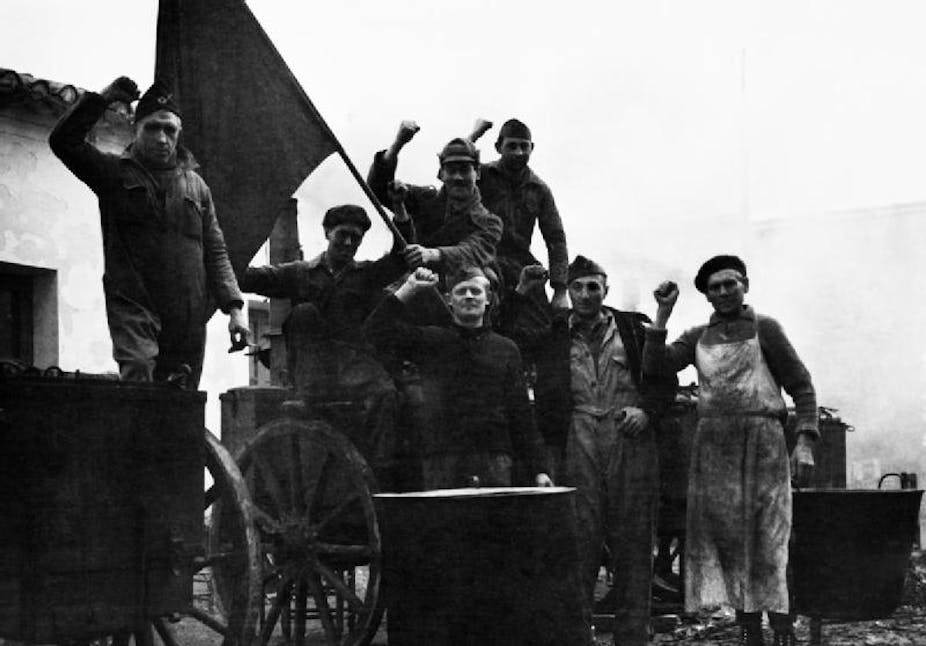Now Mr Speaker, I hope the house will bear with me if I direct my closing remarks to my Labour friends and colleagues on this side of the House.
So began the final moments of shadow foreign secretary Hilary Benn’s speech to the British parliament as it debated whether to enter the fight against Islamic State in Syria.
This was a speech delivered by the quiet man of the Labour frontbenches with steely determination and emotive appeal. But perhaps most importantly it was a plea to certain historical traditions designed to sway Labour colleagues to vote for the airstrikes.
The effect was electric. MPs on both sides of the House applauded and cheered. Not since Tony Blair’s final Prime Minister’s Questions in 2007 has such a spontaneous bipartisan ovation occurred. Benn’s impassioned body language and the ranging timbre of his voice hushed the house. It was a memorable piece of parliamentary oratory.
However, like most effective political speeches it required a certain degree of artistic licence with the historical record and the stretching of historical analogies.
The key component to the final flourishes of Benn’s speech was his reclaiming of the Labour Party’s internationalist tradition. This was achieved by evoking the volunteers who joined the Spanish Civil War in the 1930s and by equating Islamic State’s ideology to fascism:
We are here faced by fascists … And what we know about fascists is that they need to be defeated. And it is why, as we have heard tonight, socialists and trade unionists and others joined the International Brigade in the 1930s to fight against Franco… And my view, Mr Speaker, is that we must now confront this evil. It is now time for us to do our bit in Syria. And that is why I ask my colleagues to vote for the motion tonight.
Of course, the politicised use of analogical reasoning is not a new phenomenon. How many times have we heard warnings of “another Munich” when dealing with dictators, or interpretations of the Iraq War as “another Vietnam”?
However, over the past decade, these comparisons have become far more politicised. These days, analogical reasoning is less a tool to help politicians make decisions and more a tool for helping them justify decisions they’ve already made. It has become a self-serving process.
The Islamo-fascist fallacy
Sure enough, advocates and opponents of British military action against Islamic State have attempted to deploy historical metaphors to bolster their arguments. Benn is the latest in a long line of people to harness anti-fascist analogies during debates about Islamist terrorism.
In the immediate wake of the 9/11 attacks, Francis Fukuyama coined the phrase “Islamo-fascism” to describe the ideology of al-Qaeda. The response to al-Qaeda, Fukuyama reasoned, must constitute an all-encompassing mobilisation of liberal democratic forces. The Nazis were defeated with bombs, not because their beliefs fell apart – and the same would be true for this new enemy.
Yet the simplicity of the Islamist/Fascist analogy is misleading. It encourages us to believe that all threats to Western security can be discouraged by annihilation. It is blind to the huge cultural and religious variations between Nazism and Islamism. It ignores the fact that Nazi Germany was a state-based actor using conventional weapons, whereas Islamic State fighters are non-state actors (albeit with the pretensions of statehood) who deploy insurgent tactics. Then there is the totalising nature of World War II versus the precision targeting of modern terrorist groups.
The Islamist/Fascist analogy is used in order to try and make sense of an unfamiliar, indeed frightening, present by relating it to a familiar, perhaps reassuring, moment from the past when the West was shaken but ultimately vanquished its enemies.
A very modern speech
Contemporary political communication rests on a fundamental desire to control the narrative of events. Politicians strengthen their narratives by using (or abusing) historical metaphors to encourage the public to make certain connections. If a historical event is commonly conceived of as just, then its modern-day equivalent must be too.
Metaphor creates imagery, which has a potent power of persuasion – something Hilary Benn’s speech evidently exemplified. Unfortunately, the speech also rested on a misguided set of historical assumptions.
The Spanish myth
It has been a common intellectual trend to perceive the high levels of intervention in the Spanish Civil War as a foretaste of the wider struggle between fascism and its opponents that would engulf Europe in 1939.
Antony Beevor, in his book on the Spanish Civil War, went as far as to label it a “world war by proxy” given how the quantity of external intervention was indicative of the fomenting ideological struggles that the wider continent was experiencing.
This is exactly why Benn’s Spanish analogy missed its mark. Labour Party members in the 1930s had to volunteer as private citizens to join the ranks of the anti-Franco militias. That was precisely because the British government proposed no direct military action itself. A non-intervention pact prevented Britain from propping up the democratic government in Spain.
The decision of individual Labour Party members to join a proxy war in Spain in the 1930s stood in stark contrast to the ability of the Parliamentary Labour Party to foment any direct military intervention. The central argument of Benn’s cri de coeur was actually to engender the exact opposite outcome to Spain – don’t rely on proxies because we should fight as a nation against the threat.
An impassive Jeremy Corbyn watched on from the seat behind Benn during this speech. Not since Robin Cook at his rambunctious best has a Labour Foreign Affairs spokesman been so strikingly independent of his party leader. Benn’s speech was a wonderful reminder of the power of political oratory. But stretched historical analogies need not be the price paid for effective speechmaking.

